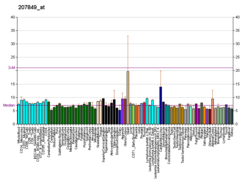Interleukin-2 (IL-2) is an interleukin, a type of cytokine signaling molecule in the immune system. It is a 15.5–16 kDa protein[5] that regulates the activities of white blood cells (leukocytes, often lymphocytes) that are responsible for immunity. IL-2 is part of the body's natural response to microbial infection, and in discriminating between foreign ("non-self") and "self". IL-2 mediates its effects by binding to IL-2 receptors, which are expressed by lymphocytes. The major sources of IL-2 are activated CD4+ T cells and activated CD8+ T cells.[6] Put shortly the function of IL-2 is to stimulate the growth of helper, cytotoxic and regulatory T cells.
- ^ a b c GRCh38: Ensembl release 89: ENSG00000109471 – Ensembl, May 2017
- ^ a b c GRCm38: Ensembl release 89: ENSMUSG00000027720 – Ensembl, May 2017
- ^ "Human PubMed Reference:". National Center for Biotechnology Information, U.S. National Library of Medicine.
- ^ "Mouse PubMed Reference:". National Center for Biotechnology Information, U.S. National Library of Medicine.
- ^ Arenas-Ramirez N, Woytschak J, Boyman O (December 2015). "Interleukin-2: Biology, Design and Application" (PDF). Trends in Immunology. 36 (12): 763–777. doi:10.1016/j.it.2015.10.003. PMID 26572555. S2CID 3621867.
- ^ Cite error: The named reference
Liao_2011was invoked but never defined (see the help page).





